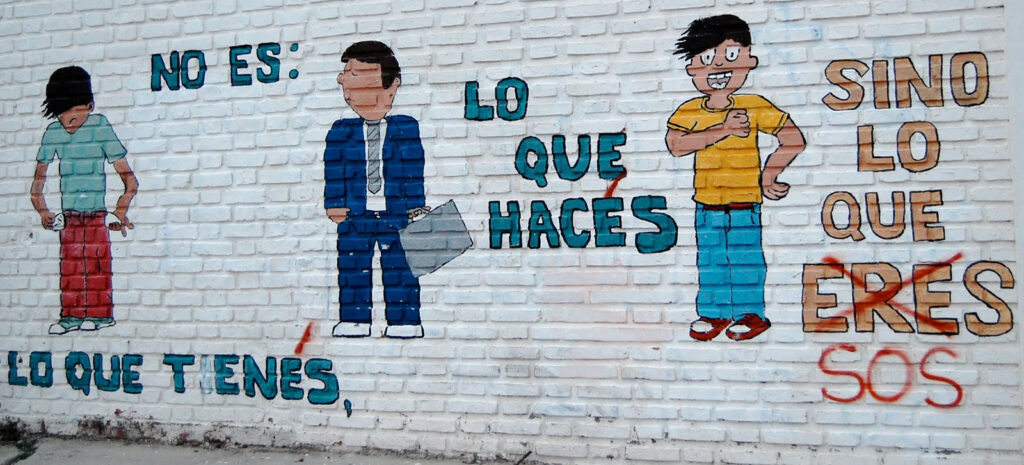“Usted”, “Vos” and “Tú” in Costa Rica

Forms of address in Costa Rica : the use of “usted”, “vos” and “tú”
Although we share the same language throughout Hispanic America and Spain, it varies in many ways from country to country and from region to region. These variants are called “dialects”. There are, for example, Argentine, Mexican, Chilean or Costa Rican dialects. They also present differences in some areas. In Spain, for example, it is spoken differently in Madrid and in Andalucía; in Costa Rica we have clearly defined a Central Plateau dialect and another one of the regions of Guanacaste and Puntarenas. Dialectal variations can include vocabulary, phonetics and grammar.
Let’s recall that in Spanish there are three grammatical persons, singular and plural; some have feminine gender. The first person is yo (the speaker); the second person (the receiver) can be tú, vos or usted and the third person (the one being spoken about) is él or ella. These three persons, in plural, are: nosotros (masculine) and nosotras (feminine) (first person), vosotros/vosotras and ustedes (second person) and ellos/ellas (third person).
As for the second person (singular or plural), there are forms of treatment of “trust” and “respect”, depending on the receiver. When the receiver is a person of trust, tú or vos is used depending on the dialect, and when the receiver is someone of respect, usted is used. In the plural, the forms corresponding to the treatment of confidence are vosotros (you) and to the treatment of respect, ustedes (you).
In Costa Rica: “Usted”, “Vos” and “Tú”
The use of vos in Costa Rica
In Costa Rica, a dialectal characteristic of grammatical type is the use of the pronoun “vos”, instead of “tú” for the second person singular of trust. This is called “voseo”. Talking as vos to the receiver has been part of the Costa Rican’s cultural identity; this is an use that occurs in all social classes and in the cultured norm.
The cultured norm is the way of speaking of educated people, in any dialect; it is the one of prestige and the one used by academics, professionals and the media.
Tú
In spite of the fact that, in general, Costa Ricans consider that voseo is their own and it identifies them, some people -especially young people- have begun to use tuteo (talking as tú) in the country. This happens, possibly, because of the influence of television (soap operas and series dubbed in tuteantes countries), movies or radio, because of snobbery or because they consider tuteo to be more elegant and polite; those who use it feel different or important.
Like tú, vos is used when the receiver is someone you trust (friend, classmate, colleague, person of the same age). However, it’s common in our country to use usted (second person singular of respect) to address the boyfriend, husband, parents, children and siblings, babies and small children, and pets. For example: “No llore, mi chiquito; ya le doy la lechita” (Don’t cry, my little boy; I’ll give you the milk) or “Lorita, deme la patica” (Lorita, give me your paw). With these people and pets, there’s a lot of trust and it would be expected that the vos would be used since, in tuteantes countries, the tú is normally used with them.
Usted
In these cases, in Costa Rica a usted is used, which can be considered a respectful affection and not a formal distance, as when the wife asks her husband: “Mi amor, recoja usted a Dani en la escuela, por favor” (My love, please pick up Dani at school). The treatment of usted is also used with strangers, hierarchical superiors and people of greater age, regardless of social class; it is combined, then, with the use of “don” (Mr.) and “doña” (Mrs.). To the gardener we would say: “Don Manuel, siémbreme esta begonia aquí, por favor” (Don Manuel, please plant this begonia here).
Vosotros/ Ustedes
Vosotros and vosotras (second person plural) are not used in America as the forms of address of trust corresponding to the tú from Spain. The only pronoun used is ustedes, both for respect and trust. Thus, instead of, “¿Dónde estudiaréis?” (Where will you study?), in Costa Rica and in the other American dialects we would say, “¿Dónde estudiarán ustedes?”.

On the New Use of Tuteo in Costa Rica and Conjugation Errors
“Usted”, “vos” and “tú” in Costa Rica
Vos has its special verb forms in all tenses and modes in the present tense, but for the past and future tenses, the same forms are used as for tú.
For example, in the present tense (indicative, subjunctive and imperative):
“Vos cantás boleros muy bien” (You sing boleros very well), “Quiero que cantés en la fiesta” (I want you to sing at the party), “Cantá ahora” (Sing now).
In the past tense: “¿Vos cantaste (tú cantaste) en esa reunión?” (Did you sing at that meeting?), “Vos cantabas (tú cantabas) en un coro, ¿verdad?” (You sang (you sang) in a choir, didn’t you?).
In the future tense: “Vos cantarás (tú cantarás) en ese programa de televisión!” (You will sing on that TV show!)
A misuse currently heard among Costa Ricans trying to talk about tú is the mixing of verb forms in the same sentence. They combine verbs conjugated with tú, with verbs conjugated with vos, and even with usted:
“Vení para que me digas que va a traer usted a la fiesta” (Come and tell me what you are bringing to the party) or “¿Cómo estás, mae? Yo bien, ¿y tú?; ¿cómo se siente después de la operación?” (How are you, mae? I’m fine, how are you; how do you feel after the operation?)
In the School System
Until a few years ago, in the Costa Rican school system, only tú and vosotros verbs were taught; even though they were never used in the spoken language, students learned to write them. For this reason, people who always spoke of vos, wrote with the forms of tú. Nowadays, voseo is taught to be written and many advertisements and dialogues in stories and novels present it.
Author: Gilda Rosa Arguedas Cortés Linguist; retired professor at the University of Costa Rica. [email protected]
References
Navigate articles





